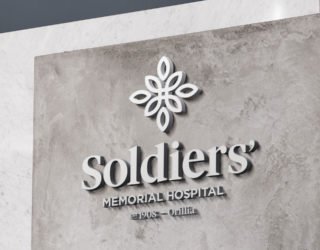OSMH prepares for return of Nuclear Medicine testing following extensive main floor renovation
(Orillia, ON) – Orillia Soldiers’ Memorial Hospital (OSMH) is nearing the final phase of an extensive renovation project aimed at enhancing services in multiple departments, including Emergency and Diagnostic Imaging. The final phase will see a return of Nuclear Medicine services that had to be temporarily referred out to partner hospitals while construction work was underway.
A significant portion of the main floor was reconfigured to create additional space to meet growing needs in the Emergency Department, and to house a new, modern CT scanner that was installed earlier this year.
“The new CT is physically located now where our Nuclear Medicine services were provided,” said Kate Smith, OSMH Director of Diagnostic Imaging. “We are now completing the work that will allow us to bring back Nuclear Medicine imaging in mid- 2023”.
“The project has allowed us to expand our busy CT service into much-needed space to build additional efficiencies into the collaborative work already being done by our Emergency and Diagnostic Imaging teams.”
In order to accommodate the space requirements for Nuclear Medicine services however, the Hospital is suspending Sleep Lab services, and referring patients to providers outside Orillia.
“These are difficult decisions but as the community continues to grow, and we have a limited footprint of space to work with, we have to focus on areas of greatest need,” said Carmine Stumpo, OSMH President and CEO.
Stumpo also pointed to the opening of additional beds, both onsite and offsite, over the past two years, that has further impacted the hospital’s physical capacity.
“Our community is growing and we’re experiencing it first-hand in our hospital every day. Quite simply, we’re running out of space, and that its why we need to start today with planning a new hospital to serve our community going forwards.”
At OSMH, CT imaging services support acute diagnosis, cancer screening, diagnosis and surveillance with 16,000 patients receiving CT imaging last year. Nuclear medicine imaging is utilized in the diagnosis of cancer and cardiac disease for approximately 1,200 OSMH patients per year.
-
Letter to the Community - July 18, 2024 Although the lazy days of summer have begun, it is anything but at Orillia Soldiers’ Memorial Hospital. ...
![Letter to the Community - July 18, 2024]()
-
OSMH welcomes new Chair and 3 new Directors as hospital recounts highly successful 2023/24 at Fireside Chat (Orillia, ON) – Lawre Pietras is beginning his 7th year on the Orillia Soldiers’ Memorial Hospital (OSMH) ...
![OSMH welcomes new Chair and 3 new Directors as hospital recounts highly successful 2023/24 at Fireside Chat]()
-
2023-2024 Annual Report to the Community: June 27th Fireside Chat https://youtu.be/LMiPr6pfn4M Public invited to attend community engagement session in person or online As part of ...
![2023-2024 Annual Report to the Community: June 27th Fireside Chat]()


